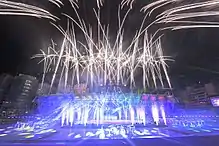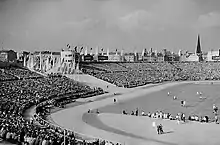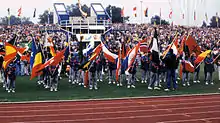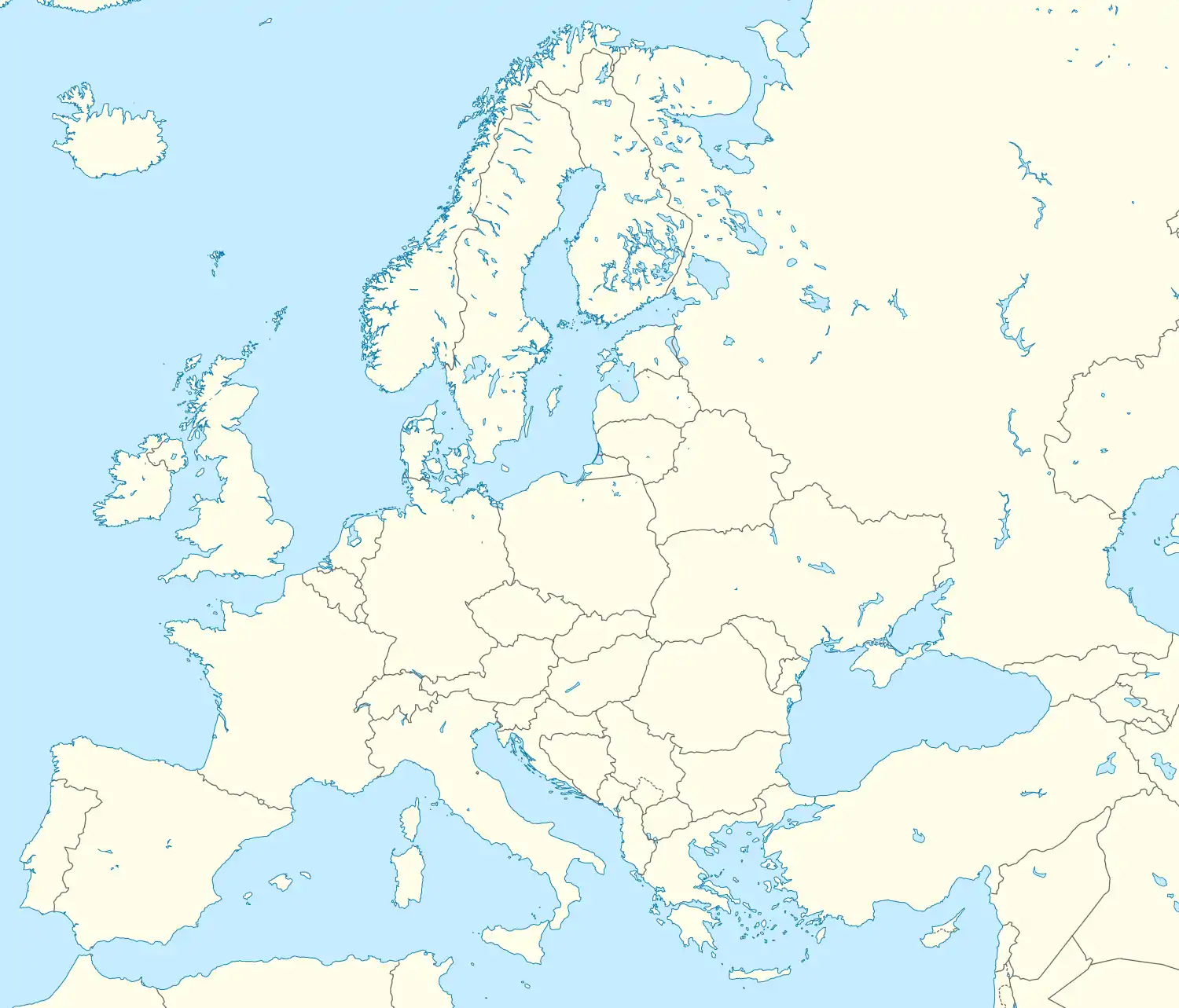Universiade
The Universiade is an international multi-sport event, organized for university athletes by the International University Sports Federation (FISU). The name is a combination of the words "University" and "Olympiad". The Universiade is referred to in English as the World University Games or World Student Games; however, this latter term can also refer to competitions for sub-University grades students. The Universiade is the largest multi-sport event in the world apart from the Olympic Games.[1] The most recent games were in 2019: the Winter Universiade was in Krasnoyarsk, Russia while the Summer Universiade was held in Naples, Italy. The 2021 Winter Universiade will take place in Lucerne, Switzerland between 11 and 21 December 2021,[2][3] and the 2021 Summer Universiade will be held in Chengdu, China between 18 and 29 August 2021.
| Universiade | |
|---|---|
 The flag of the International University Sports Federation. | |
| Status | active |
| Genre | sporting event |
| Frequency | biennial |
| Location(s) | various |
| Inaugurated | 1959 (summer) 1960 (winter) |
| Organised by | FISU |
Precursors
The idea of a global international sports competition between student-athletes pre-dates the 1949 formation of the International University Sports Federation (FISU), which now hosts the Universiade. English peace campaigner Hodgson Pratt was an early advocate of such an event, proposing (and passing) a motion at the 1891 Universal Peace Congress in Rome to create a series of international student conferences in rotating host capital cities, with activities including art and sport. This did not come to pass, but a similar event was created in Germany in 1909 in the form of the Academic Olympia. Five editions were held from 1909 to 1913, all of which were hosted in Germany following the cancellation of an Italy-based event.[4]

At the start of the 20th century, Jean Petitjean of France began attempting to organise a "University Olympic Games". After discussion with Pierre de Coubertin, the founder of the modern Olympic Games, Petitjean was convinced not to use the word "Olympic" in the tournament's name.[4] Petitjean, and later the Confederation Internationale des Etudiants (CIE), was the first to build a series of international events, beginning with the 1923 International Universities Championships. This was followed by the renamed 1924 Summer Student World Championships a year later and two further editions were held in 1927 and 1928. Another name change resulted in the 1930 International University Games. The CIE's International University Games was held four more times in the 1930s before having its final edition in 1947.[5][6]



A separate group organised an alternative university games in 1939 in Vienna, in post-Anschluss Germany.[5] The onset of World War II ceased all major international student sport activities and the aftermath also led to division among the movement, as the CIE was disbanded and rival organisations emerged. The Union Internationale des Étudiants (UIE) incorporated a university sports games into the World Festival of Youth and Students from 1947–1962, including one separate, unofficial games in 1954. This event principally catered for Eastern European countries.[7]
After the closure of the CIE and the creation of the first UIE-organised games, FISU came into being in 1949 and held its own first major student sport event the same year in the form of the 1949 Summer International University Sports Week. The Sports Week was held biennially until 1955. Like the CIE's games before it, the FISU events were initially Western-led sports competitions.[5]
Division between the largely Western European FISU and Eastern European UIE eventually began to dissipate among broadened participation at the 1957 World University Games. This event was not directly organised by either group, instead being organised by Jean Petitjean in France (which remained neutral to the split), but all respective nations from the groups took part. The FISU-organised Universiade became the direct successor to this competition, maintaining the biennial format into the inaugural 1959 Universiade. It was not until the 1957 World University Games that the Soviet Union began to compete in FISU events. That same year, what had previously been a European competition became a truly global one, with the inclusion of Brazil, Japan and the United States among the competing nations. The increased participation ultimately led to the establishment of the Universiade as the primary global student sport championship.[4][5]
Precursor events
| Year | Event | Organiser | Host city | Host country |
|---|---|---|---|---|
| 1923 | International Universities Championships | CIE | Paris | |
| 1924 | Summer Student World Championships | CIE | Warsaw | |
| 1927 | Summer Student World Championships | CIE | Rome | |
| 1928 | Summer Student World Championships | CIE | Paris | |
| 1930 | International University Games | CIE | Darmstadt | |
| 1933 | International University Games | CIE | Turin | |
| 1935 | International University Games | CIE | Budapest | |
| 1937 | International University Games | CIE | Paris | |
| 1939 | International University Games | CIE | Monte Carlo | |
| 1939 | International University Games | CIE | Vienna | |
| 1947 | International University Games | CIE | Paris | |
| 1947 | World Festival of Youth and Students | UIE | Prague | |
| 1949 | World Festival of Youth and Students | UIE | Budapest | |
| 1949 | Summer International University Sports Week | FISU | Merano | |
| 1951 | World Festival of Youth and Students | UIE | East Berlin | |
| 1951 | Summer International University Sports Week | FISU | Luxembourg | |
| 1953 | World Festival of Youth and Students | UIE | Bucharest | |
| 1953 | Summer International University Sports Week | FISU | Dortmund | |
| 1955 | World Festival of Youth and Students | UIE | Warsaw | |
| 1955 | Summer International University Sports Week | FISU | San Sebastián | |
| 1957 | World Festival of Youth and Students | UIE | Moscow | |
| 1957 | World University Games | CIE | Paris | |
| 1959 | World Festival of Youth and Students | UIE | Vienna | |
| 1962 | World Festival of Youth and Students | UIE | Helsinki |
Summer World University Games
Location map
Editions
| Games | Year | Host country (as recognized by FISU) |
Host city | Opened by | Dates | Nations | Competitors | Sports | Events | Top nation |
|---|---|---|---|---|---|---|---|---|---|---|
| 1 | 1959 | Turin | Giovanni Gronchi | 26 August – 7 September | 45 | 985 | 7 | 60 | ||
| 2 | 1961 | Sofia | Dimitar Ganev | 25 August – 3 September | 32 | 1270 | 9 | 68 | ||
| 3 | 1963 | Porto Alegre | Paulo de Tarso Santos | 30 August – 8 September | 27 | 917 | 9 | 70 | ||
| 4 | 1965 | Budapest | István Dobi | 20–30 August | 32 | 1729 | 9 | 74 | ||
| 5 | 1967 | Tokyo | Hirohito | 27 August – 4 September | 30 | 937 | 10 | 83 | ||
| 6 | 1970 | Turin | Giuseppe Saragat | 26 August – 6 September | 40 | 2080 | 9 | 82 | ||
| 7 | 1973 | Moscow | Leonid Brezhnev | 15–25 August | 72 | 2765 | 10 | 111 | ||
| 8 | 1975 | Rome | Giovanni Leone | 18–21 August | 38 | 450 | 1 | 38 | ||
| 9 | 1977 | Sofia | Todor Zhivkov | 17–28 August | 78 | 2939 | 10 | 101 | ||
| 10 | 1979 | Mexico City | José López Portillo | 2–13 September | 85 | 2974 | 10 | 97 | ||
| 11 | 1981 | Bucharest | Nicolae Ceauşescu | 19–30 July | 86 | 2912 | 10 | 133 | ||
| 12 | 1983 | Edmonton | Charles, Prince of Wales | 1–12 July | 73 | 2400 | 10 | 118 | ||
| 13 | 1985 | Kobe | Akihito | 24 August – 4 September | 106 | 3949 | 11 | 123 | ||
| 14 | 1987 | Zagreb | Lazar Mojsov | 8–19 July | 122 | 6423 | 12 | 139 | ||
| 15 | 1989 | Duisburg | Helmut Kohl | 22–30 August | 79 | 1785 | 4 | 66 | ||
| 16 | 1991 | Sheffield | Anne, Princess Royal | 14–25 July | 101 | 3346 | 11 | 119 | ||
| 17 | 1993 | Buffalo | Bill Clinton | 8–18 July | 118 | 3582 | 12 | 135 | ||
| 18 | 1995 | Fukuoka | Akihito | 23 August – 3 September | 118 | 3949 | 12 | 144 | ||
| 19 | 1997 | Sicily | Oscar Luigi Scalfaro | 20–31 August | 122 | 3582 | 10 | 129 | ||
| 20 | 1999 | Palma de Mallorca | Infanta Elena, Duchess of Lugo | 3–13 July | 114 | 4076 | 12 | 142 | ||
| 21 | 2001 | Beijing | Jiang Zemin | 22 August – 1 September | 165 | 6757 | 12 | 170 | ||
| 22 | 2003 | Daegu | Roh Moo-hyun | 21–31 August | 174 | 7180 | 13 | 189 | ||
| 23 | 2005 | Izmir | Ahmet Necdet Sezer | 11–22 August | 133 | 7816 | 15 | 195 | ||
| 24 | 2007 | Bangkok | Vajiralongkorn | 8–18 August | 150 | 12000 | 15 | 236 | ||
| 25 | 2009 | Belgrade | Mirko Cvetković | 1–12 July | 145 | 5379 | 15 | 203 | ||
| 26 | 2011 | Shenzhen | Hu Jintao | 12–23 August | 165 | 7999 | 24 | 306 | ||
| 27 | 2013 | Kazan | Vladimir Putin | 6–17 July | 162 | 10442 | 27 | 351 | ||
| 28 | 2015 | Gwangju | Park Geun-hye | 3–14 July | 142 | 12885 | 21 | 274 | ||
| 29 | 2017 | Taipei | Tsai Ing-wen | 19–30 August | 145 | 11397 | 22 | 272 | ||
| 30 | 2019 | Naples | Sergio Mattarella | 3–14 July | 112 | 5971 | 18 | 220 | ||
| 31 | 2021 | Chengdu | 18–29 August | 18 | 268 | |||||
| 32 | 2023 | Yekaterinburg | 8–19 August | 18 | ||||||
1 The ![]() Republic of China (Taiwan) is recognised as Chinese Taipei by the FISU and the majority of international organisations it participates in due to political considerations and Cross-Strait relations with the People's Republic of China.
Republic of China (Taiwan) is recognised as Chinese Taipei by the FISU and the majority of international organisations it participates in due to political considerations and Cross-Strait relations with the People's Republic of China.
Top 10 medal table
| Rank | Nation | Gold | Silver | Bronze | Total |
|---|---|---|---|---|---|
| 1 | 513 | 440 | 402 | 1355 | |
| 2 | 443 | 308 | 253 | 1004 | |
| 3 | 438 | 360 | 425 | 1223 | |
| 4 | 407 | 330 | 250 | 987 | |
| 5 | 353 | 337 | 436 | 1126 | |
| 6 | 245 | 201 | 237 | 683 | |
| 7 | 195 | 208 | 260 | 663 | |
| 8 | 176 | 184 | 176 | 536 | |
| 9 | 168 | 140 | 155 | 463 | |
| 10 | 117 | 162 | 217 | 496 | |
| 11 | 116 | 93 | 111 | 320 | |
| 12 | 97 | 118 | 140 | 355 | |
| 13 | 91 | 125 | 187 | 403 | |
| 14 | 85 | 98 | 119 | 302 | |
| 15 | 72 | 70 | 73 | 215 | |
| 16 | 69 | 106 | 120 | 295 | |
| 17 | 56 | 52 | 77 | 185 | |
| 18 | 49 | 100 | 129 | 278 | |
| 19 | 49 | 54 | 69 | 172 | |
| 20 | 40 | 44 | 49 | 133 | |
| Totals (20 nations) | 3779 | 3530 | 3885 | 11194 | |
Winter World University Games
Location map
Editions
| Games | Year | Host country | Host city | Opened by | Dates | Nations | Competitors | Sports | Events | Top nation | ||
|---|---|---|---|---|---|---|---|---|---|---|---|---|
| Total | Men | Women | ||||||||||
| 1 | 1960 | Chamonix | Charles de Gaulle | 28 February – 6 March | 16 | 145 | 5 | 13 | ||||
| 2 | 1962 | Villars | Paul Chaudet | 6–12 March | 22 | 330 | 6 | 12 | ||||
| 3 | 1964 | Špindlerův Mlýn | Antonín Novotný | 11–17 February | 21 | 410 | 5 | 15 | ||||
| 4 | 1966 | Sestriere | Giuseppe Saragat | 5–13 February | 29 | 434 | 6 | 19 | ||||
| 5 | 1968 | Innsbruck | Franz Jonas | 21–28 January | 26 | 589 | 7 | 23 | ||||
| 6 | 1970 | Rovaniemi | Urho Kekkonen | 3–9 April | 25 | 591 | 7 | 24 | ||||
| 7 | 1972 | Lake Placid | Richard Nixon | 26 February – 5 March | 23 | 410 | 7 | 25 | ||||
| 8 | 1975 | Livigno | Giovanni Leone | 6–13 April | 15 | 191 | 2 | 13 | ||||
| 9 | 1978 | Špindlerův Mlýn | Gustáv Husák | 5–12 February | 21 | 347 | 7 | 16 | ||||
| 10 | 1981 | Jaca | Juan Carlos I | 25 February – 4 March | 28 | 347 | 7 | 19 | ||||
| 11 | 1983 | Sofia | Todor Zhivkov | 17–27 February | 28 | 347 | 7 | 21 | ||||
| 12 | 1985 | Belluno | Sandro Pertini | 16–24 February | 34 | 7 | 30 | |||||
| 13 | 1987 | Štrbské Pleso | Gustáv Husák | 21–28 February | 21 | 347 | 6 | 25 | ||||
| 14 | 1989 | Sofia | Todor Zhivkov | 2–12 March | 21 | 347 | 8 | 40 | ||||
| 15 | 1991 | Sapporo | Naruhito | 2–10 March | 34 | 8 | 40 | |||||
| 16 | 1993 | Zakopane | Lech Wałęsa | 6–14 February | 41 | 8 | 36 | |||||
| 17 | 1995 | Jaca | Juan Carlos I | 18–28 February | 41 | 9 | 35 | |||||
| 18 | 1997 | Muju-Jeonju | Kim Young-sam | 24 January – 2 February | 48 | 9 | 51 | |||||
| 19 | 1999 | Poprad-Vysoké Tatry | Rudolf Schuster | 22–30 January | 40 | 8 | 52 | |||||
| 20 | 2001 | Zakopane | Aleksander Kwaśniewski | 7–17 February | 41 | 9 | 52 | |||||
| 21 | 2003 | Tarvisio | Renzo Tondo | 16–26 January | 46 | 10 | 59 | |||||
| 22 | 2005 | Innsbruck-Seefeld | Heinz Fischer | 12–22 January | 50 | 1,500 | 11 | 68 | ||||
| 23 | 2007 | Turin | George Killian | 17–27 January | 48 | 11 | 72 | |||||
| 24 | 2009 | Harbin | Liu Yandong | 18–28 February | 44 | 2,326 | 12 | 81 | ||||
| 25 | 2011 | Erzurum | Abdullah Gül | 27 January – 6 February | 52 | 1,880 | 11 | 66 | ||||
| 26 | 2013 | Trentino | Ugo Rossi | 11–21 December | 50 | 1,725 | 12 | 79 | ||||
| 27 | 2015 | Štrbské Pleso-Osrblie | Andrej Kiska | 24 January – 1 February | 43 | 1,551 | 11 | 68 | ||||
| Granada | Felipe VI | 4–14 February | ||||||||||
| 28 | 2017 | Almaty | Nursultan Nazarbayev | 29 January – 8 February | 57 | 1,604 | 12 | 85 | ||||
| 29 | 2019 | Krasnoyarsk | Vladimir Putin | 2–12 March | 58 | 3,000 | 11 | 76 | ||||
| 30 | 2021 | Lucerne | 11–21 December [8] | 10 | 68 | |||||||
| 31 | 2023 | Lake Placid[9] | 12–22 January | 10 | ||||||||
Winter Universiade All Time Top 10 medal table
| Rank | Nation | Gold | Silver | Bronze | Total |
|---|---|---|---|---|---|
| 1 | 208 | 189 | 174 | 571 | |
| 2 | 111 | 96 | 70 | 277 | |
| 3 | 105 | 77 | 71 | 253 | |
| 4 | 95 | 105 | 97 | 297 | |
| 5 | 78 | 65 | 76 | 219 | |
| 6 | 52 | 49 | 25 | 126 | |
| 7 | 51 | 57 | 59 | 167 | |
| 8 | 51 | 50 | 55 | 156 | |
| 9 | 49 | 58 | 64 | 171 | |
| 10 | 49 | 47 | 53 | 149 | |
| 11 | 39 | 32 | 39 | 110 | |
| 12 | 33 | 48 | 56 | 137 | |
| 13 | 33 | 42 | 40 | 115 | |
| 14 | 29 | 23 | 28 | 80 | |
| 15 | 28 | 25 | 32 | 85 | |
| 16 | 25 | 27 | 41 | 93 | |
| 17 | 22 | 25 | 24 | 71 | |
| 18 | 20 | 24 | 20 | 64 | |
| 19 | 20 | 20 | 27 | 67 | |
| 20 | 19 | 30 | 30 | 79 | |
| Totals (20 nations) | 1117 | 1089 | 1081 | 3287 | |
See also
References
- "Summer Universiade". www.fisu.net. Retrieved 21 September 2017.
- "Lucerne 2021 Winter Universiade postponed, will not take place in January 2021". FISU. 31 August 2020.
- Morgan, Liam (6 November 2020). "Lucerne 2021 Winter Universiade rescheduled for December". insidethegames.biz. Retrieved 26 November 2020.
- Bell, Daniel (2003). Encyclopedia of International Games. McFarland and Company, Inc. Publishers, Jefferson, North Carolina. ISBN 0-7864-1026-4.
- World Student Games (pre-Universiade). GBR Athletics. Retrieved on 2010-12-10.
- FISU History. FISU. Retrieved on 2014-12-09.
- World Student Games (UIE). GBR Athletics. Retrieved on 2014-12-09.
- "Lucerne 2021 Winter Universiade to be held in December 2021". FISU. 6 November 2020.
- "Lake Placid set to host 2023 Winter Universiade after MoU signed with FISU". Inside the Games. 6 March 2018.
External links
| Wikimedia Commons has media related to Universiade. |
.svg.png.webp)
